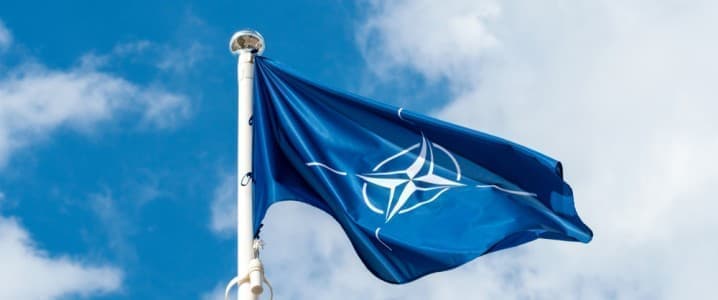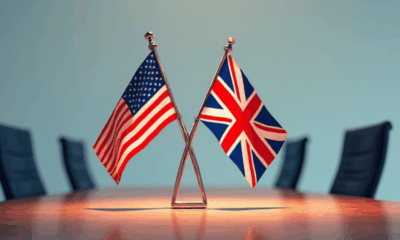Business
Could “Article 5-Like” Guarantees Pave Path to Ukrainian Peace?

Security guarantees for Ukraine have become a focal point in efforts to resolve the ongoing conflict stemming from Russia’s invasion. On August 17, 2023, White House special envoy Steve Witkoff highlighted the term “Article 5-like” during an interview with CNN, suggesting that the United States and its allies could provide significant assurances to Ukraine. Although Witkoff did not elaborate on the details, he indicated that these assurances could play a pivotal role in a potential peace framework.
The concept of “Article 5-like protections” draws inspiration from NATO’s founding treaty, particularly the clause that views an armed attack on one member as an attack on all. It is crucial to note that this does not obligate NATO members to engage in full military intervention. Instead, it states that each member “will assist the Party or Parties so attacked by taking forthwith, individually and in concert with the other Parties, such action as it deems necessary, including the use of armed force.”
Since NATO’s formation in 1949, Article 5 has been invoked only once, following the September 11 attacks, which led to various alliance-supported operations. A potential quasi-Article 5 arrangement would adapt this collective-defense principle for Ukraine, but it would not grant Ukraine NATO membership, a scenario specifically ruled out by Donald Trump.
A tailored agreement would be established among nations willing to participate, with the specifics of the pact being paramount. The focus is less on the terminology used and more on the commitments made by the involved parties, including how quickly and forcefully they would respond if Ukraine faced further aggression. This uncertainty has led to skepticism among Ukrainians, who recall the 1994 Budapest Memorandum. This agreement offered security assurances in exchange for Ukraine relinquishing its nuclear arsenal but failed to prevent subsequent Russian hostility.
Concerns are echoed by Radoslaw Sikorski, Poland’s Foreign Minister, who pointed out that Ukraine’s issue is not merely a lack of assurances but rather the failure to uphold them. He referenced a treaty ratified by Vladimir Putin on April 22, 2004, emphasizing that adherence to such agreements could have averted the ongoing conflict.
The proposal has garnered support from prominent figures, including Ursula von der Leyen, President of the European Commission, who expressed the EU’s readiness to contribute. In her words, “Ukraine must become a steel porcupine, undigestible for potential invaders,” underscoring the necessity for robust defenses.
Geopolitically, the implications of these guarantees present a complex situation. If the proposed security measures effectively mirror NATO’s deterrent capacity, it raises questions about why the Kremlin would accept them. One possible explanation is that Russia may view non-NATO guarantees as less binding and more open to negotiation regarding their scope and geographical coverage. When Witkoff was asked whether Russia would allow NATO-style guarantees, he stated, “We got to an agreement that the US and other European nations could effectively offer Article 5-like language for security guarantees.”
Conversely, if these guarantees are diluted to gain Russian approval, they risk failing to deter aggression, particularly from Moscow. The effectiveness of any security framework will hinge on the commitments made by the nations involved and their willingness to act decisively in defense of Ukraine.
-

 Entertainment3 months ago
Entertainment3 months agoAnn Ming Reflects on ITV’s ‘I Fought the Law’ Drama
-

 Entertainment4 months ago
Entertainment4 months agoKate Garraway Sells £2 Million Home Amid Financial Struggles
-

 Health3 months ago
Health3 months agoKatie Price Faces New Health Concerns After Cancer Symptoms Resurface
-

 Entertainment3 months ago
Entertainment3 months agoCoronation Street’s Carl Webster Faces Trouble with New Affairs
-

 Entertainment3 months ago
Entertainment3 months agoWhere is Tinder Swindler Simon Leviev? Latest Updates Revealed
-

 World2 weeks ago
World2 weeks agoBailey Announces Heartbreaking Split from Rebecca After Reunion
-

 Entertainment2 weeks ago
Entertainment2 weeks agoCoronation Street Fans React as Todd Faces Heartbreaking Choice
-

 Entertainment4 months ago
Entertainment4 months agoMarkiplier Addresses AI Controversy During Livestream Response
-

 Science1 month ago
Science1 month agoBrian Cox Addresses Claims of Alien Probe in 3I/ATLAS Discovery
-

 Health5 months ago
Health5 months agoCarol Vorderman Reflects on Health Scare and Family Support
-

 Entertainment4 months ago
Entertainment4 months agoKim Cattrall Posts Cryptic Message After HBO’s Sequel Cancellation
-

 Entertainment3 months ago
Entertainment3 months agoOlivia Attwood Opens Up About Fallout with Former Best Friend




















